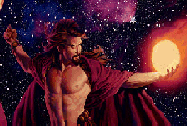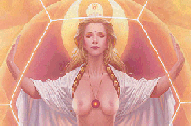


 |
 |
 |
 |
Conceptions of the God by
Linda Wilson Let's face it. There is not much material published on the God. And, is it any wonder? The Goddess appears to be more loving, more understanding and caring than the God. The God, through no fault of His own, may appear to be unapproachable except in ritual, and even then formalized prayers are necessary. This is a natural human reaction, even among Pagans and easily explains the lack of material regarding Him. One of the reasons for this problem isn't hard to figure out. Many new Pagans, especially those from other religious backgrounds, have difficulty in approaching the God. For their entire lives, they've been taught that there's only one God, and He has been given a negative, frightening image. He is portrayed as the God of vengeance and war. True, this god is nice to his worshipers, but any who don't worship Him, and Him alone, are doomed to spend eternity in a pit of fire and torture, with no hope of another chance or escape. Vivid tales of His wrath are firmly imprinted in children's minds at a young and impressionable age. It can be difficult for some of these people, now grown and entering Paganism, to overcome such a deeply ingrained conception of male Deity. The God has been given a bad name by years of patriarchal hype that has strayed very far off the path that Jesus taught. The "Church" has transformed the male conception of Deity into a wrathful being in whose followers have wiped out entire civilizations and destroyed hundreds of cultures. A God in whose name millions of persons have been killed in holy wars. It isn't surprising, then, that many new Pagans don't feel comfortable with the Pagan concept of God? Women may have a particularly difficult time. While they may be surprised and delighted to have found a religion that embraces women, that acknowledges their inner power and spiritual strength, that allows them to participate as leaders in ritual and that - incredibly - actually worships a Goddess, they may not be quite able to bring the God into their rites. It can be difficult to overcome so many years of negative God Imagery. Some eventually adjust and have no difficulty in worshiping both the Goddess and the God in ritual. Then again, others wish to direct their worship solely to the Goddess. Many have, quite frankly, had enough of male spiritual conceptions. For them, worship of the Goddess is completely fulfilling and, except when trying to adapt Goddess-God rituals to strictly Goddess rites, they have no problems with solely honoring the Goddess. These are personal decisions but, fact of the mater is: Paganism consists of the worship of the Goddess AND the God. To be blunt, your rites should honor both. This may necessitate rediscovering the God by expanding your awareness of Him and of His attributes. Here are some ideas: Do you see the God as a bringer of death? Remember that death is necessary at some point, and that the Goddess brings us rebirth. Do you see the God as the bringer of war? Remember, that war is rarely religious in nature: it's main motivations are politics and money. Religion is usually just an excuse. Do you see the God as a judge, as the caster-down of human souls into hell? Pagans don't accept the existence of hell; no one casts us down anywhere and the God unconditionally loves us. Do you see God as a frightening, unknowable spirit hovering around the Earth? See Him, instead, in face of your brother, uncle, husband, lover. See Him in the eyes of your son, grandson, cousin, male friend. See Him in majestic trees, in the harvest; in towering, snow-capped mountains; in the Sun that warms the Earth and provides us our food and all our tools for living. The God should share an equal place in our hearts, for without Him, our world would be cold, void of fertility and all life. Though many do not experience as emotional a response to the God as they do to the Goddess, He's certainly called upon in times of need (particularly for protection) Here are some attributes of the God:
Remember, the God compliments the Goddess. Just as many view the Goddess as Maiden, Mother, Crone, the God can be viewed as Lover, Hunter, Sage. The Maiden, and the Lover are the youthful aspects, The Mother, and the Hunter, the creative, nurturing aspects and the Crone and the Sage the older, wise aspects. I hope that these ideas provide some assistance to those who find it hard to make a connection with the God. This is a major problem and is one of the reasons why Goddess spirituality is so prevalent today. As with the Goddess you may have already seen the God in a vision, dream or meditation. He may have appeared in the incense smoke during ritual. If not, He may well yet make Himself visible to you. Once again; Ask a hundred people if they have seen the God, and you will get a hundred fifty different descriptions! Again, some see the God in the terms of cultural concepts: "Pan", "Grandfather", "Belinus." "Osiris" "Apollo".Others may be in more generic, nameless: A tanned, virile youth, A strong Hunter, A wise old Sage. Every one is a highly personal vision of the God. None are incorrect. Use the methods described in the article on Goddess Conceptions to form your image of The God. There are symbols that Pagans use to represent the God in creating ritual and poetry. As you might imagine, there are fewer of these symbols than for the Goddess.
So, time to get out the notebooks again.... You know the routine! Remember: The God is just as much a part of Paganism as is the Goddess. He isn't fearsome unless you decide to focus on his fearsome attributes. (This is also true of the Goddess). He can be the ultimate of compassion, caring and nurturing, but only you can allow yourself to discover this. |
|